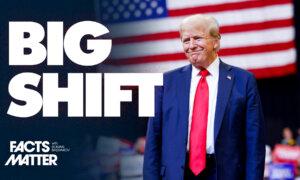Grover Cleveland was the 22nd and 24th president who took office in a post-Civil War era at another time when the country was facing division.
President-elect Donald Trump will become the second president in the United States to serve two nonconsecutive terms when he takes office as the 47th president in January of 2025.
The first president to win nonconsecutive terms in office was President Grover Cleveland more than 120 years ago.
Also the first Democrat to be elected president after the Civil War, Cleveland served in the White House from March 1885 to March 1889, and after losing the 1888 election, he was elected again and took office from March 1893 to March 1897.
Trump’s 2024 election win was largely unprecedented, as during the final days of his term, and after leaving the White House in 2021, Trump was banned from a number of social media platforms, was impeached for the second time by the House of Representatives, had his residence raided by federal agents, and defended himself against a number of indictments on both the state and federal levels.
He also had his mugshot taken at a Georgia jail, and survived two attempts on his life during his 2024 presidential campaign.
However, in spite of the string of incidents, he managed to run a well-organized campaign, gain the support of the Republican National Committee, surpass the records set by the Republican Party in terms of money, and make progress with portions of the electorate that had long been aligned with the Democrats, such as Latino voters.
Cleveland was the 22nd and 24th President of the United States who took office in a post-Civil War era at another time when the country was facing division.
Unlike Trump, however, prior to his time in the Oval Office, Cleveland held previous political offices, including becoming governor of New York in 1882, before becoming the Democratic Party’s nominee in 1884.
Daniel Klinghard, professor of political science at the College of the Holy Cross in Worcester, Massachusetts, said Cleveland was “viewed as the epitome of responsibility and stability.”
“This is a point at which the modern notion of the national party really came together,” the professor said.
“Cleveland had a group of skilled political operatives. … And they spent a lot of time sort of keeping Cleveland’s name in front of the electorate, sort of very much as Trump’s allies have done, sort of dismissing anybody else as a challenge—as a rival.”
Cleveland and Trump also both hold unique distinctions when it comes to the first ladies.
While Trump made headlines by bringing in his third wife as a first lady, Cleveland was elected as a bachelor and was the only president who married while in the White House.
Even though Cleveland won the popular vote by a slight margin, Republican Benjamin Harrison won the election in the Electoral College during Cleveland’s first run for a second term in 1888.
Despite this, Cleveland continued to enjoy a positive reputation among the general population.
In 1892, when he won his second term, he was successful in taking both the popular vote and the electoral vote.
Initiatives in Office
Donald Trump’s second-term objectives emphasize energy independence, immigration, economic policies, and social policies.
On immigration, Trump intends to recommence the construction of the border wall, pursue mass deportations of illegal immigrants, terminate birthright citizenship for children born in the United States to parents who are in the country illegally, and reinstate “remain in Mexico” policies.
In terms of economics, he intends to eliminate the tax on gratuities and overtime and provide additional corporate tax reductions to U.S.-based manufacturers.
Furthermore, he suggests the implementation of a blanket tariff on imports to safeguard U.S. employment and industries, particularly from competition with China.
Another significant objective is to achieve energy independence, which will be achieved through the expansion of domestic hydrocarbon drilling, including in the Arctic, and the withdrawal from the Paris climate agreement.
Additionally, he has left the regulation of abortion to the states and intends to implement a federal prohibition on transgender athletes from participating in women’s sports.
While in office, Cleveland focused on restricting federal intervention in economic affairs during his tenure, and despite the potential political backlash, Cleveland signed the Interstate Commerce Act, the first federal law to regulate railroads, and advocated for lower tariffs.
During a discussion in which he called on Congress to reduce high protective tariffs, he was reportedly advised it was an unwise political choice, to which he responded: “What is the use of being elected or re-elected unless you stand for something?”
Jack Phillips and The Associated Press contributed to this report.
Original News Source Link – Epoch Times
Running For Office? Conservative Campaign Consulting – Election Day Strategies!


